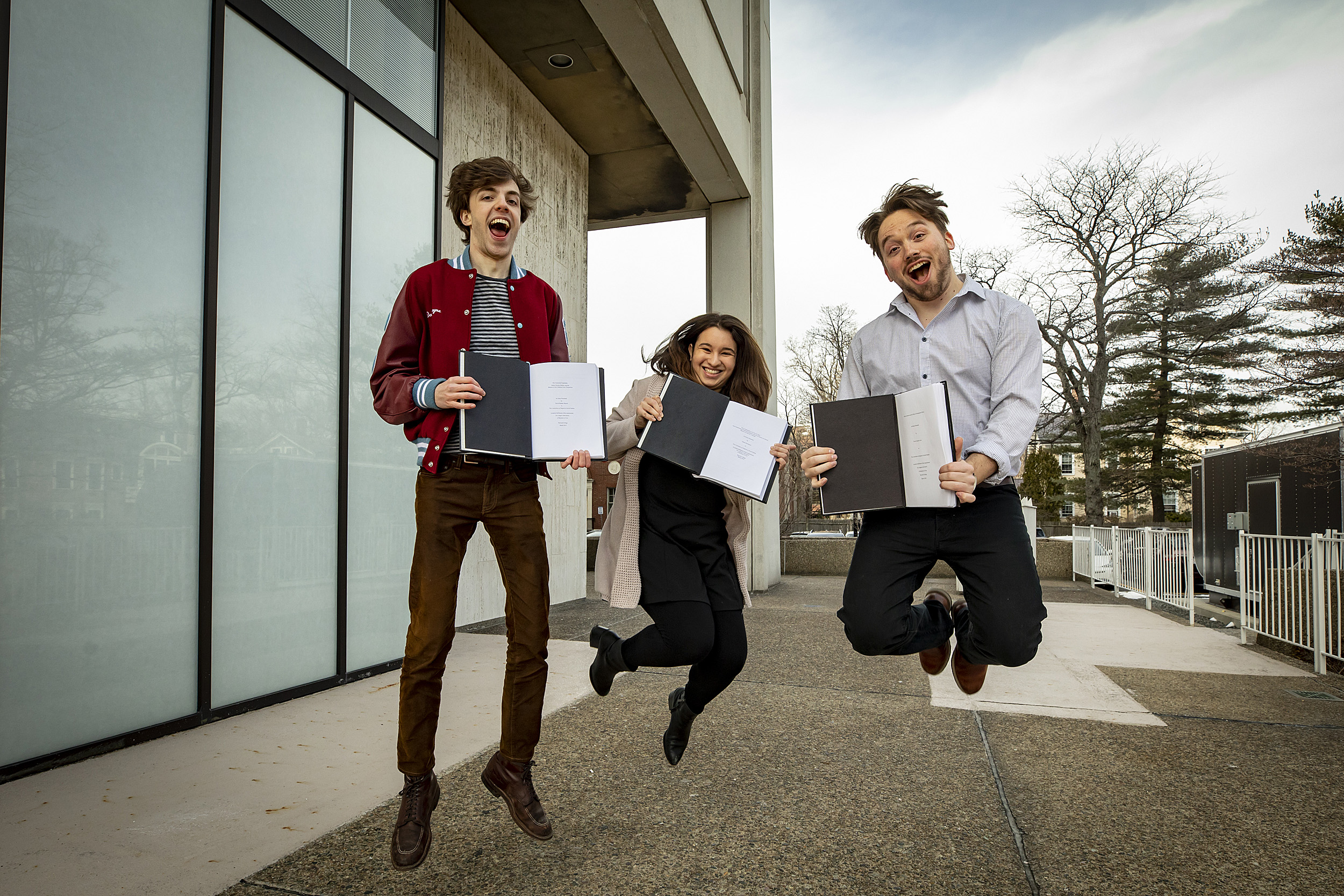
David Shayne (far left) handed in his thesis an hour before the deadline. Joining him in his jump for joy are Juliana Rodriguez and Trevor Levin.
Rose Lincoln/Harvard Staff Photographer
Whew, that’s done!
With senior theses turned in, students can celebrate a major academic achievement
For many, writing a senior thesis is the ultimate academic challenge of College life. About half of Harvard students undertake this weighty endeavor, which is required only for honors students at most Schools. On deadline day, their original research, writing, and tortured all-nighters are sometimes rewarded with interdepartmental parties featuring cake and champagne.
More tributes follow the March filings — at least for a lucky few — in early May with the announcement of the Hoopes Prize, which recognizes outstanding undergraduate research. A few days later, the Harvard John A. Paulson School of Engineering and Applied Sciences (SEAS) holds its annual Design & Project Fair, where dean’s awards are bestowed for outstanding engineering projects.
Lyra Wanzer ’19, who built an electroadhesive treaded microrobot, was one of this year’s four winners. She was delighted. “I put so much work and time in this,” said Wanzer, a Vermont native who fell in love with robotics in high school. “So many hours for a whole year.”
Students in the engineering bachelor’s program at SEAS are required to work on a capstone project, similar to a thesis, which aims to solve a real-world problem. Wanzer built a 6-centimeter-long microrobot with treads like a military tank. It can stick to conductive surfaces and could be used for search and rescue operations or inspecting pipes, engines, and other places where the human hand can’t reach.
Across the University, the thesis is a rite of passage that students approach with mixed feelings. There is dread about the amount of work involved — each thesis must be between 10,000 and 20,000 words, 60 to 100 pages, and involve original research — but also a deep feeling of accomplishment once it’s finally done.
Such was the case for David Shayne ’19, who is concentrating in social studies with a secondary in visual and environmental studies. Shayne handed in his thesis on the history of the American economic crises one hour before the deadline. He was tired after sleeping little in the previous 48 hours, but mostly overwhelmed by pride and joy.
“I’m exhausted and stunned that the thesis exists and that I produced so many pages [about 100],” he said, looking a bit disheveled on the March 13 deadline. “I did my thesis by the sheer tyranny of will. It’s a weird and wonderful feeling.”
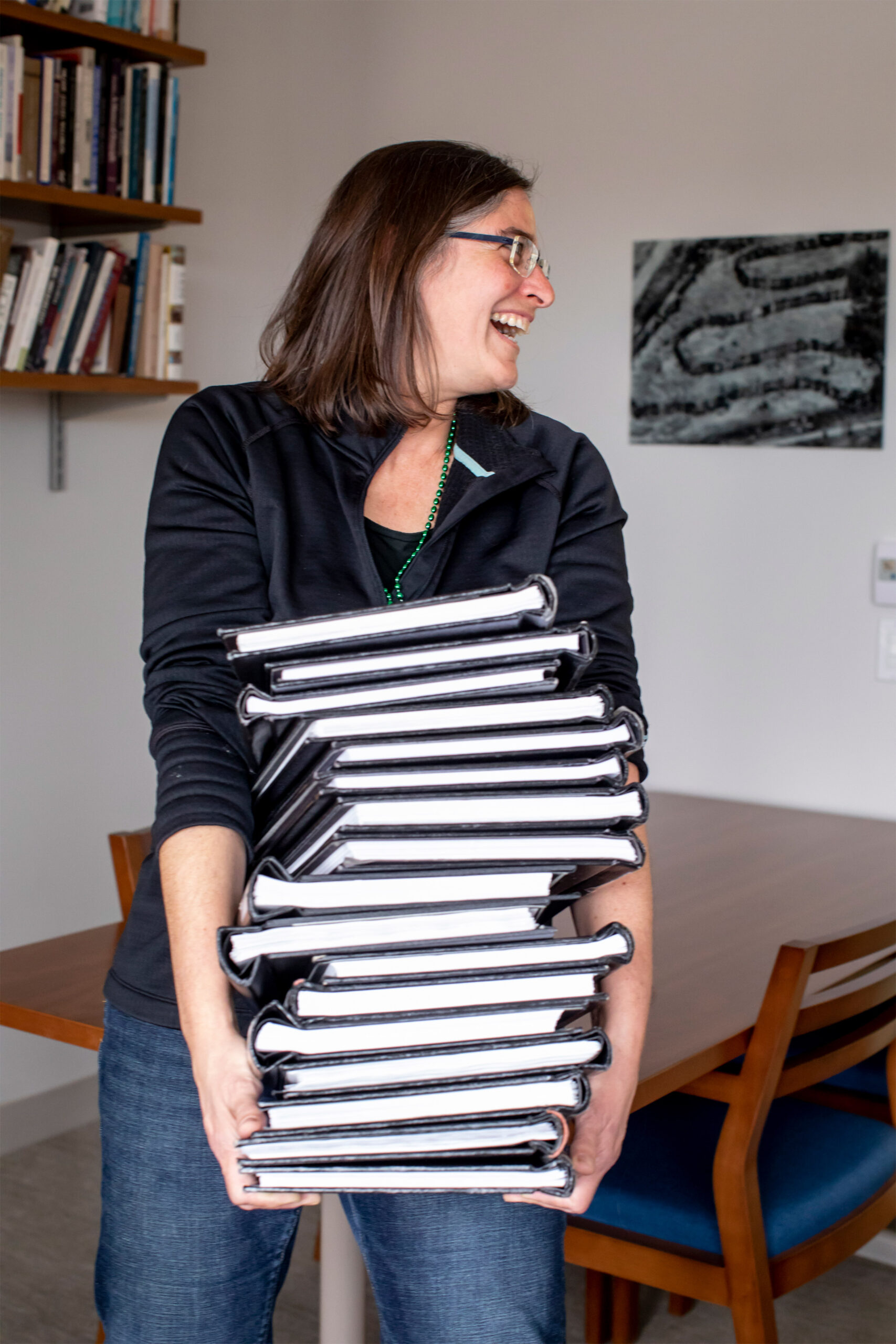
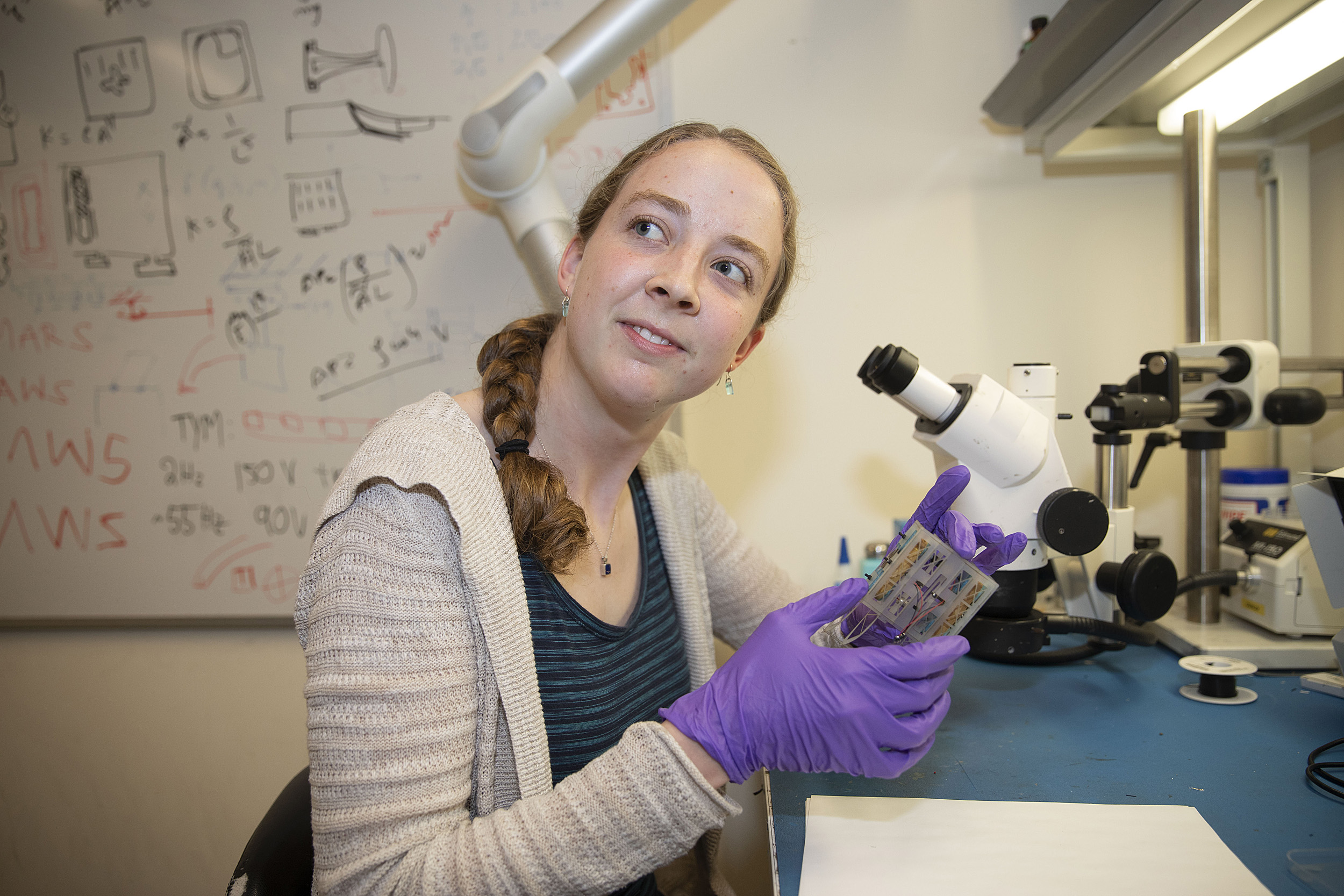
Nicole Dejong Newendorp, assistant director of Undergraduate Studies, holds some of the many theses handed in on “Thesis Day.” Lyra Wanzer ‘19 built an electroadhesive treaded robot for her capstone project.
Rose Lincoln (left) and Kris Snibbe/Harvard Staff Photographers
In most Schools a thesis is optional, but it is a requirement for students on the honors track. About half of all students across the College pursue honors within their concentrations; the numbers vary according to Schools and departments. Lauren Bimmler, undergraduate program administrator in the English Department, said 34 out of 48 seniors there are on the honors track.
A lower percentage of SEAS students write senior theses. This year, 42 out of 140 computer science concentrators wrote one, as did 30 out of 100 students concentrating in applied mathematics.
For Hyo-Won Jeon, who is concentrating in social studies, working on her thesis meant sacrifice. When she handed it in, she felt relieved.
“Every day was truly a test,” said Jeon, who spent the night before the deadline at the library working on her paper on intercountry adoptees who don’t have U.S. citizenship. “The hardest part was not being able to spend time with my friends because I was working.”
Students don’t undertake the challenge alone. The University offers tutorials, seminars, and workshops on how to choose a topic, do research, and write the thesis, and assigns advisers who guide students through the whole process. They may also apply for grants for research and travel.
For seniors in the S.B. engineering program, SEAS requires the two-semester capstone course “Engineering Design Projects” (ES 100). This year’s projects showed a wide array of interests, from a 3D-printable implant to replace part of the ear’s canal wall to a wearable device that provides early detection of infection in pediatric patients to a portable gadget that measures atmospheric mercury levels.
Seniors concentrating in applied mathematics also demonstrated a broad array of interests, said Sarah Iams, assistant director of undergraduate studies in applied mathematics.
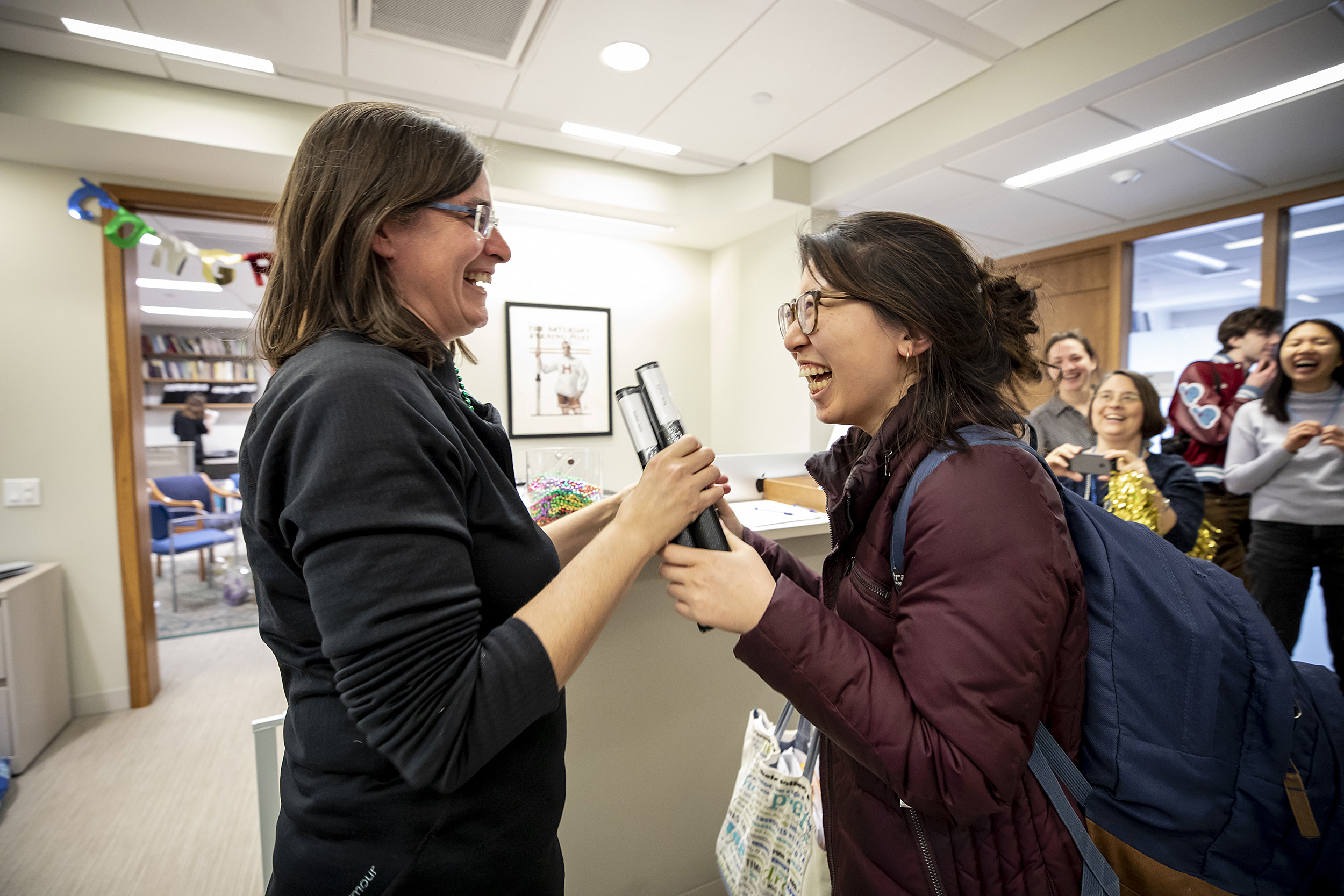
“It’s a cool, wide range of topics, from sports theses to economic questions to decoding Inca quipus,” said Iams.
In the English Department, students can write critical or creative theses. Bimmler said creative theses, such as collections of poems or short stories, novellas, and screenplays, are on the rise. Two years ago, Obasi Shaw ’17 turned in “Liminal Minds,” the first rap album ever submitted at the English Department.
This year, there were 13 creative theses and next year officials anticipate 23, said Bimmler.
For many students the best part of tackling a thesis is that they can choose any topic, depending on their interests or fields of study. Among this year’s Hoopes Prize winners are works on female judges and crime in India, American country music in Italy, Nazis in America, gang violence in El Salvador, and the spread of the invasive strawberry guava in Madagascar’s rainforests.
Schools have different deadlines for students to turn in their theses. In the Social Studies Department, it’s always the Wednesday before spring break to allow students enjoy the recess without any thesis-related concerns. At SEAS, it’s the last Friday of March.
On deadline day, some Schools hold small parties with champagne, cake, and hors d’oeuvres to cheer on students as they arrive with the product of their labor. It’s a well-deserved celebration, said Anya Bernstein Bassett, senior lecturer and director of studies in social studies.
“They take on an independent project and go through the ups and downs because there are always challenges,” said Bassett. “Your interview subjects won’t talk to you, you go to a field site and it’s not what you expected, and they have to manage through that. It says so much about who they are and how committed they are.”
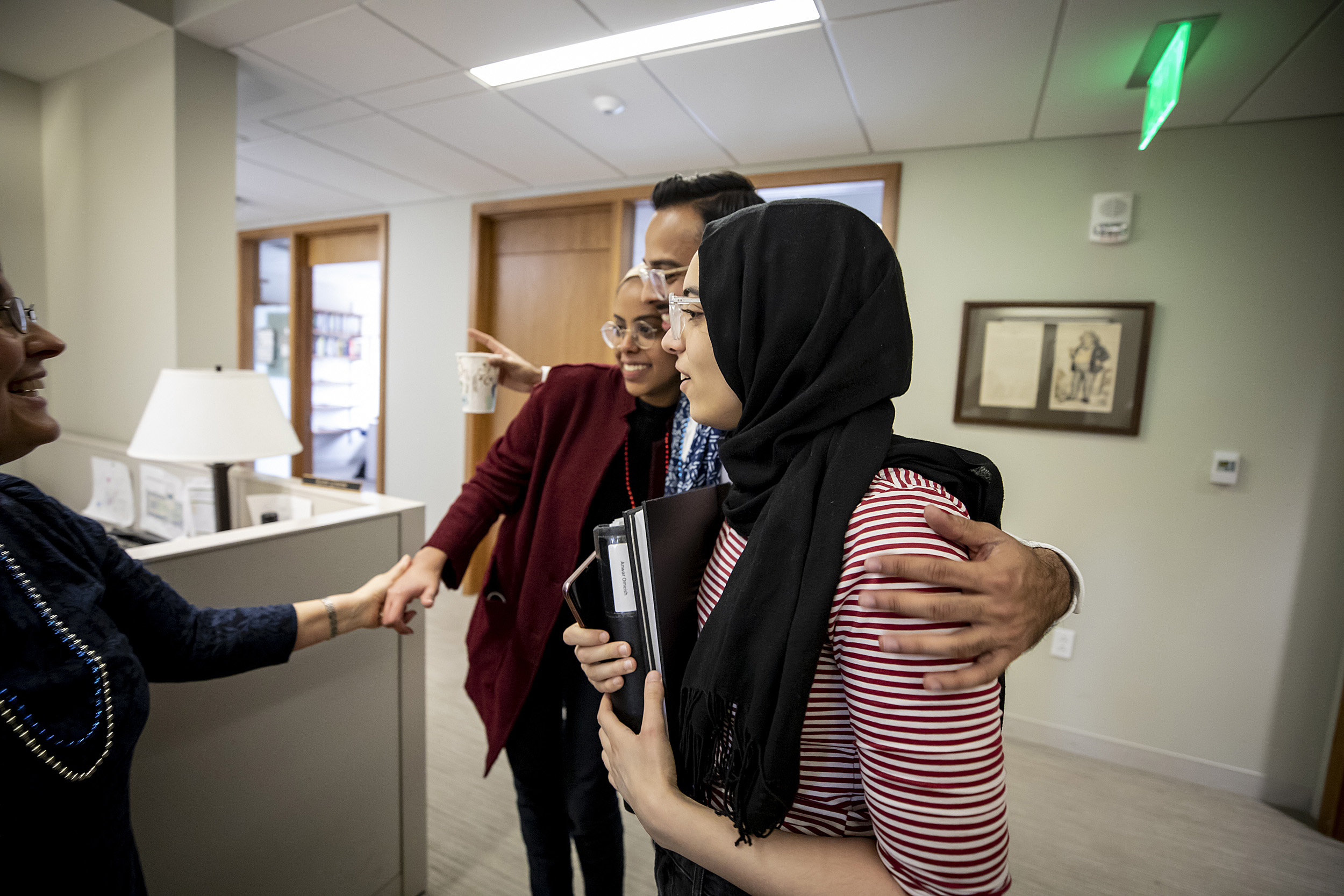
Juliana Rodrigues ’19, who’s concentrating in social studies, shared the sentiment.
“It’s a capstone for your educational experience at Harvard,” she said. “It’s a way to reflect back on everything you’ve learned in your time here and bring that all together that speaks to who you are and what you value.”
Anna Antongiorgi ’19 is concentrating in English with a secondary in Theater, Dance & Media. Her creative thesis was both an intellectual and emotional enterprise. She wrote a collection of 120 poems inspired by her love of writing and dancing.
In many ways, the paper didn’t feel like homework, said Antongiorgi, who began dancing at age 5 and started writing poems in high school. At times, it was cathartic, at times overwhelming, but mostly it was enjoyable. The process has led her to ponder new possibilities.
“I’m still writing,” said Antongiorgi. “It felt like it was just the beginning. I don’t feel finished.”



